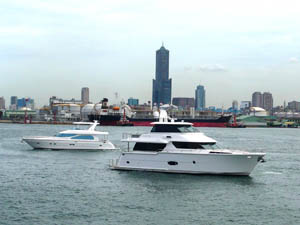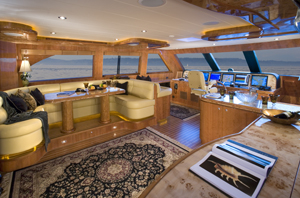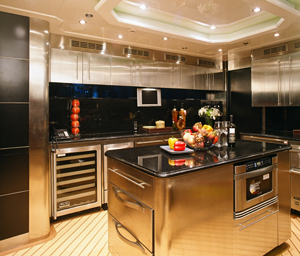Taiwan’s Top-2 Yacht & Marine Hardware Suppliers Talk Shop
Yacht-as-status-symbol mindset blocks suppliers in Taiwan from Chinese market
2012/03/06 | By Steve ChuangThe global financial tsunami, albeit sparing the designer goods sector, has caused Taiwan’s yacht-building industry to list over the past few years, with the ripple-effect washing over downstream suppliers of yacht and marine hardware, including the top-2 in Taiwan—Man Ship Machinery & Hardware Co., Ltd. and Aritex Products Co., Ltd., who have stepped up adjusting corporate strategies to stay afloat amid the choppy seas, as well as see differently the outlook in the coming years.
Since its establishment in 1982 in Kaohsiung, southern Taiwan, Man Ship has been specializing in production of stainless hatches, portholes, aluminum boat windows and yacht fittings, 40% of which for the domestic market and 60% for overseas. The company leads the supply of deck hatches with at least a 95% share of the domestic segment, and has become an OEM (original equipment manufacturer) for some globally leading yacht builders.

Incorporated in 1983, Aritex is a globally prestigious OBM or original brand manufacturer of fittings for luxury yachts, including anchors, mooring posts, railings, bar chairs, steering wheels, fuel tanks, water tanks, pull doors, stainless steel windows, hydraulic lifting booms, hydraulic shoring ladders etc. under its own brand Aritex, which counts among its clients major international yacht builders as Luerssen, Nobiskrug, HDW, Hakvoort, Feadship, Royal Huisman and CMN of Europe, and Trinity, Christensen, New Castle, Palmer Johnson and Derecktor of North America, reflecting the supplier’s global brand recognition.
Used Yachts to Sustain Growth
“Compared to new yachts, the market for used yachts has remained robust in recent years, which will fuel parts and hardware replacement in the short term,” says Ali Huang, general manager of Man Ship, who believes that Taiwanese suppliers can ride such trend to rally soon.
Despite credit tightening, Huang says that demand for yachts and megayachts is still stable in the U.S. and Europe, which is mainly sustained by a booming second-hand segment.
Based on his observations, Huang says that output of Taiwan’s yacht industry plummeted to only 30% from 2009 through 2011 from the peak in 2008, with the yacht and marine hardware sector having been forced to halve output, while hardware makers actually remain in better shape than yacht builders, especially those who can go global independently. Taiwanese yacht builders suffer more severely than hardware suppliers because they don’t receive orders for new yachts and can’t access second-hand business, while hardware suppliers can better enjoy both opportunities.


Another reason behind Huang’s optimism about his industry’s outlook is that the global financial crisis had sapped the wealth of the rich and ordinary yacht owners. Tightened credit prevents ordinary people from buying new yachts and rich people from buying megayachts, with the new yacht market being primarily buoyed by now by the superrich, who are more immune to global economic fluctuations, seasoned yacht players and hence prefer premium furnishings and hardware rather than low-end products. Such trend benefits Taiwanese yacht hardware manufacturers who are globally known for excellent craftsmanship, good sense of aesthetics and guaranteed quality.
There is additional good news for Taiwanese makers. A couple of foreign competitors have been forced to restructure their business or go bankrupt in the aftermath of the global financial crisis and recession. “So there is more room for us to tap globally large yacht builders and new markets,” says Huang.
Citing several new customers from Australia, Turkey, the Middle East and Vietnam to prove this transition in the landscape, Huang says the firm came upon the chance to deal with the Australian customer last year, when its original contract supplier floundered amid worsening financial health. Partly because of the new customers, Huang says the company’s sale revenue for 2011 already recovered to over 80% of its peak in 2009.
China’s Yacht Market Slows
The yacht market in China has slowed after years of rapid growth, primarily due to credit tightening by the central government to curb the overheated realty market that has allowed speculation to create a huge number of nouveau riches, who were likely the only ones driven to buy new yachts, says Huang.
Besides, the lack of unified central-government regulations also hinders market development, despite local governments’ wishful thinking and construction of yacht harbors to promote the pastime, says Huang.
Echoing the trend in the design goods segment in Asia, Huang says that the yacht market isn’t easily accessible to Taiwanese companies for now, because most Asian buyers own yachts just to flaunt wealth, differing from those in developed countries who buy yachts as a tool for leisure, socializing, and travel on the seas. The yacht-as-status-symbol mindset drives Asians to choose only top-priced furnishings and instruments supplied by globally famous companies, which makes the competitive landscape unfavorable to Taiwanese suppliers, says Huang.
Continuous R&D to Stay Competitive
Regardless of the global economic doldrums that may continue to dampen the industry, Huang insists that steady R&D effort is the best way to keep afloat in a stormy sea.
Showing his company’s Modern Deck Hatch, Huang says that the improved hinge mechanism of the series enables the hatch to be easily opened at any angle without support arms; while Man Ship’s globally-only flexible production achieves excellent diameter range of up to 31 inches, with the company’s seasoned technologies and skillful craftsmanship giving a bright, smooth finish as well as making the deck hatch lighter than competing models. Multi-nationally patented and CE approved, this series will help the supplier to drive business growth in the coming years.
Also after years of cooperation with universities, the company has launched ventilation solutions for engine rooms on smaller yachts, including DC motor fans, blowers, dehumidifiers, and fire dampers, as well as AC ventilation solutions for larger luxury yachts. Huang also shows the newest electric windows that are in trial production and seen as a revenue generator for 2012.
After weathering the first recession in the 1990s by upgrading manufacturing to megayachts, Taiwanese yacht builders have successfully recovered in the 21st century, so Taiwanese yacht builders and hardware suppliers will find the way out the current slowdown, according to Hang.
Worse than Expected
Aritex’s general manager Mark Tseng admits that the downtrend is even steeper than expected. “We actually underestimated the impact of the 2008 global financial tsunami, while the EU debt crisis has only added salt to injury. The reality is that only 20% of Taiwanese yacht builders operate normally now, with 50% being unprofitable and 30% having suspended production.”
The global market for new yachts will take a long time to recover and the process will be very slow, especially when the global economy is widely believed to remain weak in 2012. “I think the market won’t turn around significantly this year, because election campaigns under way in the major yacht-consuming countries, like the U.S., have aroused concerns of wealth inequity. This forces the rich to suppress spending on luxury goods as yachts at least until elections end,” says Tseng.
Tseng also agrees that Taiwanese yacht builders are less likely to penetrate the Chinese market, mainly because yacht imports are subject to a 41% duty. Furthermore, over 90% of China-made yachts are sold at home, leaving little room for Taiwanese makers to compete. So Taiwanese companies shouldn’t merely pin their hopes of recovery on entering that market, instead they should pay more attention to sharpening competitiveness from manufacturing to distribution and branding.
Foresighted Investment
Tseng, in fact, had decided to boost investments years ago as strategy to better prepare for the current recession, with the efforts having paid off to some degree as the company managed to break even in 2011.
For instance, the company invested NT$40 million in capacity expansion, and NT$60 million in R&D and acquiring a local auto parts company. ”We found it a bargain for having paid an economical price for a company with paid-in capital of NT$100 million and annual revenue averaging millions of NT dollars. Besides, the buyout also enabled my company to put idle workers to production instead of laying them off in recent years,” says Tseng.
The company has also put heavy emphasis on developing electric yacht fixtures, actively learning electromechanical integration technologies from foreign technicians and training its workforce. The company’s newly developed automatic boarding ladders are adopted by megayachts and superyachts, ones longer than 100 meters. “Taiwanese yacht builders are comparable with Italians in woodworking and metalworking, but inferior in electric work. So we started delving into the field to help sharpen our capability, which also leverages our company to gradually catch up with European counterparts and keep emerging rivals behind,” says Tseng.
Teamwork is Strength
Tseng has also been tapping synergy, noting that his company has teamed up with several local companies to develop yacht furnishing solutions and a joint brand. “Taiwanese makers have to work together to compete globally, as teamwork is strength.”
Through resource integration and know-how exchange among partners, Tseng aims to build the alliance into a globally-leading provider of all-around yacht furnishing solutions comprising of manufacturing, one-stop purchase and maintenance services. The members have jointly developed high-end yacht hardware and furnishing, and are considering to invest in clean-room equipment for better product quality. Furthermore, Aritex will also try to take business into the Internet age, by building an online service platform to enable customers to order, request product replacement and maintenance and track shipment with PCs.
“The ultimate goal of the alliance is to build a joint brand with sound distribution channels, which takes considerable time to achieve but will secure promising future. Also the alliance, with every member backed by its own specialization, will be able to provide customers with world-caliber goods and services,” says Tseng.

